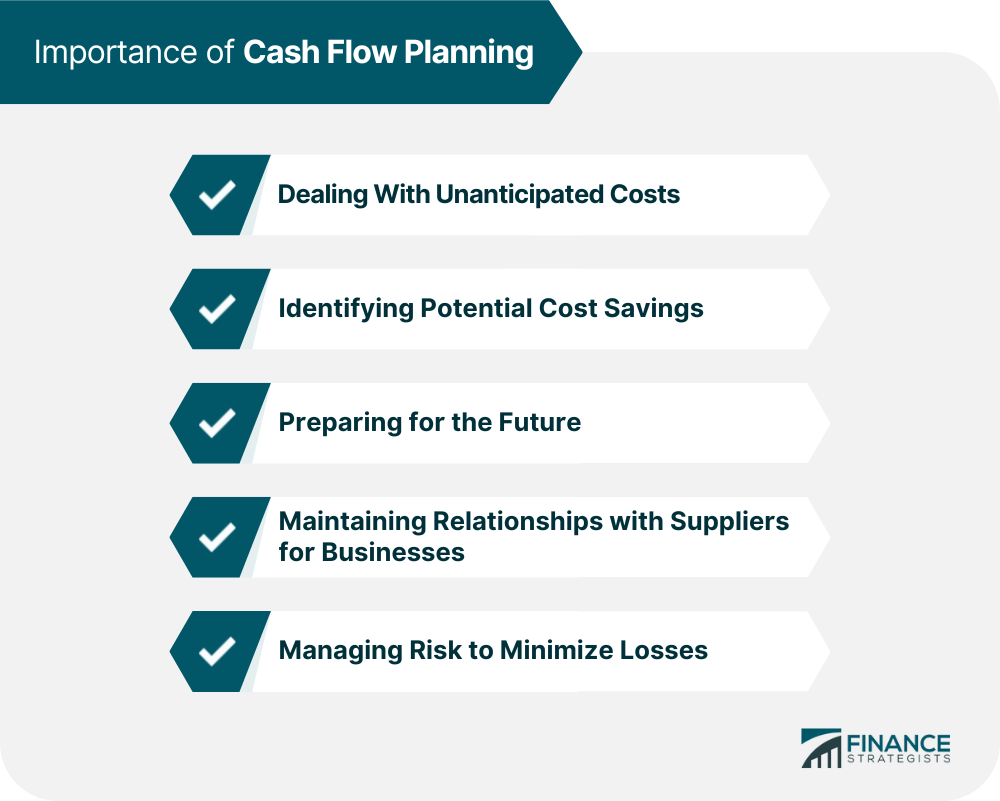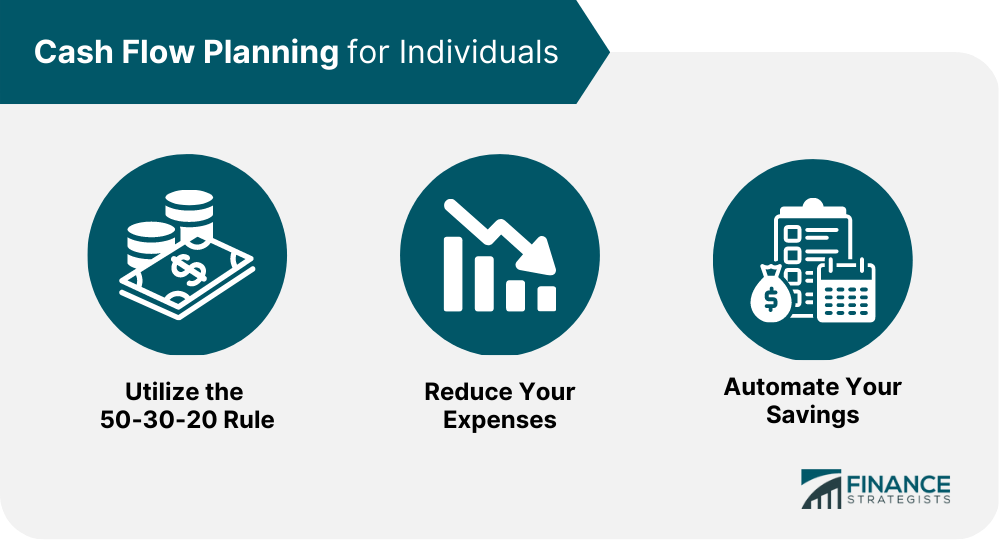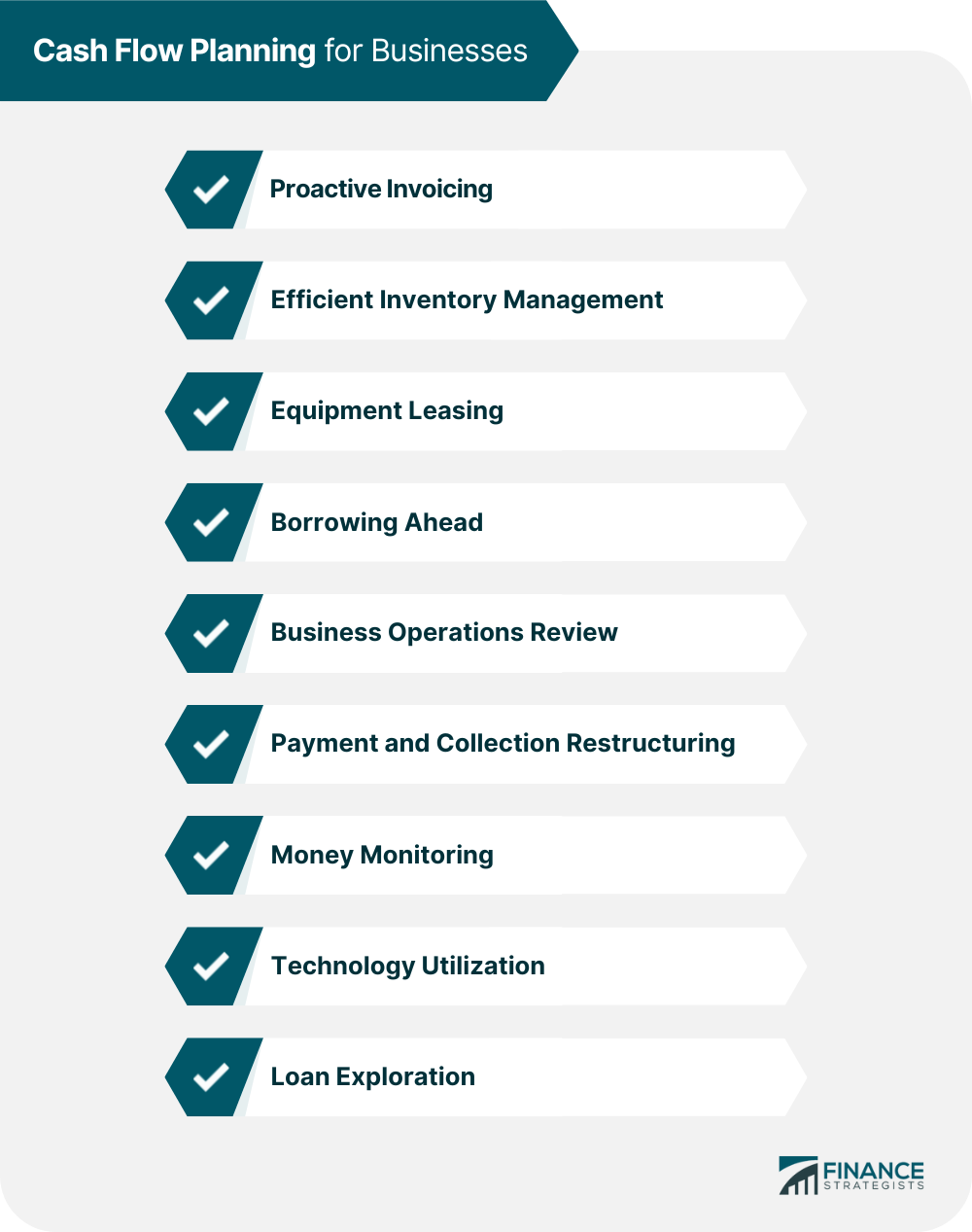Cash flow planning refers to the process of creating a detailed budget and holistic financial plan to manage income, expenses, and savings. It involves analyzing cash inflows and outflows, identifying areas of overspending, and creating a plan to improve financial stability. The purpose of cash flow planning is to help individuals, families, and businesses to manage their finances effectively and achieve their financial goals. Cash flow planning is crucial for individuals, families, and businesses for various reasons. These include: Cash flow planning is essential for dealing with unanticipated costs, such as medical bills, car repairs, and home repairs. With a cash flow plan, individuals and businesses can set aside a portion of their income to cover these unexpected expenses without having to rely on credit or loans. Cash flow planning helps individuals and businesses to identify potential cost savings by analyzing their expenses and identifying areas where they can cut back. By reducing unnecessary expenses, individuals and businesses can save money and improve their financial stability. Cash flow planning helps individuals and businesses to prepare for the future by setting financial goals and creating a plan to achieve them. Whether it is saving for a down payment on a house, planning for retirement, or building an emergency fund, a cash flow plan can help individuals and businesses to achieve their financial goals. Cash flow planning is crucial for maintaining relationships with suppliers for businesses. By managing cash flow effectively, businesses can pay their suppliers on time, which helps to build trust and maintain good relationships. Cash flow planning is important for managing risk to minimize losses. By analyzing cash inflows and outflows, individuals and businesses can identify potential risks and create a plan to mitigate them. For example, businesses can create a contingency plan for a sudden drop in revenue, while individuals can set aside money for unexpected expenses. Cash flow planning is crucial for individuals who want to manage their finances effectively and achieve their financial goals. Here are some strategies for creating a cash flow plan for individuals: The 50-30-20 rule is a popular budgeting strategy that involves dividing the income of an individual into three categories: necessities, wants, and savings. Under this rule, 50% of the income should be allocated to necessities like rent/mortgage, groceries, transportation, and internet/cell phone. The 30% should go towards wants, which may include entertainment, clothes, eating out, and other non-essential expenses. Finally, the remaining 20% should be set aside for savings. If followed consistently, the 50-30-20 rule can be an effective way to reach financial goals. However, it is important to note that the distribution of these categories may vary based on location and cost of living. In areas with a high cost of living, for example, a larger portion of the budget may need to be allocated toward housing. Once a budget has been created and expenses have been tracked, it becomes easier to identify areas where money can be saved. A good starting point is to review monthly bills, such as streaming services, internet plans, and grocery expenses, and look for ways to reduce or eliminate unnecessary expenses. It may also be beneficial to compare prices and look for the best deals to save money. Many individuals tend to wait until the end of the month to save any money they have left over, but often find that there is nothing left to save. However, a better approach is to pay yourself first. By setting up automatic withdrawals to transfer funds directly into a high-interest savings account, individuals can ensure they are saving money each month. This is particularly effective when timed with payday, as the money will not be missed from their paycheck. Improving cash flow is a process that requires time and planning. Individuals should consider their long-term goals, such as saving for retirement and create a plan to achieve those goals. While it may seem like a daunting task, every step taken will bring them closer to their ultimate financial objectives. Cash flow planning is essential for businesses, regardless of their size. Inefficient management of cash flow can lead to financial instability, debt accumulation, and the inability to pay bills or meet other financial obligations. Therefore, businesses need to create a cash flow plan that takes into account all sources of income, expenses, and savings. Here are some tips and strategies for creating a cash flow plan for businesses. Proactive invoicing is an essential strategy for businesses to manage their cash flow. It involves billing customers and clients in a timely manner and following up on overdue payments. This can be achieved by setting up an automated invoicing system that sends reminders to customers about their outstanding balances. Furthermore, offering incentives for early payment can also help speed up the payment process. Efficient inventory management is critical to optimizing cash flow in businesses that sell products. Overstocking or understocking can lead to significant financial losses. Therefore, businesses need to monitor inventory levels regularly and forecast future demand accurately. This can help ensure that they have the right amount of stock to meet customer demand while minimizing excess inventory. Leasing equipment instead of purchasing it outright can help businesses manage their cash flow. Equipment leasing enables businesses to use assets without having to pay for them upfront, which can help preserve cash reserves. Additionally, leasing can also help businesses avoid the costs associated with equipment maintenance, repairs, and upgrades. Borrowing ahead is a strategy that involves securing funding before a cash crunch occurs. This can help businesses prepare for unanticipated expenses, emergencies, or seasonal fluctuations in demand. However, it is essential to carefully assess the terms and conditions of loans to ensure that the business can repay the debt without facing undue financial strain. Reviewing business operations can help identify inefficiencies that drain cash reserves. Conducting a review of all business processes, systems, and practices can help businesses identify areas for improvement. This can include renegotiating contracts with suppliers, optimizing staffing levels, and consolidating operations. Restructuring payment and collection processes can help businesses manage their cash flow more efficiently. This can include offering discounts for early payments, negotiating extended payment terms with suppliers, and implementing electronic payment systems to speed up the collection process. Monitoring cash flow is critical to managing business finances effectively. This involves regularly tracking income and expenses to identify potential problems early. By monitoring cash flow, businesses can identify areas of overspending, reduce unnecessary costs, and improve overall financial performance. Utilizing technology can help businesses manage their cash flow more effectively. Automated bookkeeping systems, expense-tracking software, and electronic payment systems can help streamline financial processes and reduce the risk of errors. Additionally, cloud-based financial management tools can provide real-time visibility into cash flow, which can help businesses make informed financial decisions. Exploring loan options can help businesses manage their cash flow during times of financial difficulty. However, it is essential to carefully evaluate the terms and conditions of loans to ensure that they align with the financial goals and capabilities of the business. Businesses should also consider alternative financing options, such as lines of credit, factoring, or merchant cash advances. Cash flow planning is an essential process for insurance policyholders. It can help individuals manage their premiums and expenses related to insurance policies effectively. Insurance policies, including life, health, auto, and home insurance, require regular payments, which can put a strain on the finances of an individual. By creating a cash flow plan, individuals can ensure that they have sufficient funds available to meet payment deadlines for their premiums. This can prevent late fees or lapsed policies, which can lead to financial losses in case of an unexpected event. To create a cash flow plan for insurance, individuals can start by analyzing their expenses and income. They should identify the insurance premiums and due dates and factor them into their monthly budget. Additionally, they can explore ways to reduce their insurance costs, such as bundling policies, increasing deductibles, or shopping around for better rates. Cash flow planning and budgeting are two closely related concepts. Budgeting refers to the process of creating a financial plan that outlines the income and expenses of an individual or business over a specific period. The budget acts as a roadmap for managing cash flow, and cash flow planning helps to execute the plan effectively. The main difference between cash flow planning and budgeting is the time frame. Budgeting usually covers a more extended period, such as a year, while cash flow planning is more short-term, covering a few months to a year. Cash flow planning focuses on managing cash inflows and outflows to ensure that there is enough cash available to meet the budgeted expenses. By combining cash flow planning with budgeting, individuals and businesses can create a comprehensive financial plan that covers both short-term and long-term goals. They can identify areas where they can save money and prioritize expenses accordingly to achieve their financial objectives. Cash flow planning is an essential process that can help individuals and businesses manage their finances effectively. By creating a detailed cash flow plan, they can ensure that they have sufficient funds available to cover their expenses and achieve their financial goals. To create an effective cash flow plan, individuals and businesses need to analyze their income and expenses, identify areas of overspending, and explore ways to reduce costs. They should also prepare for unexpected expenses and create a buffer to absorb financial shocks. If you are struggling to manage your cash flow or need help creating a comprehensive financial plan, consider seeking the services of a financial advisor. Cash flow planning requires discipline and commitment, but the benefits of financial stability and security make it a worthwhile effort. Start planning for a better financial future by getting in touch with a financial advisor.What Is Cash Flow Planning?
Importance of Cash Flow Planning
Dealing With Unanticipated Costs
Identifying Potential Cost Savings
Preparing for the Future
Maintaining Relationships with Suppliers for Businesses
Managing Risk to Minimize Losses

Cash Flow Planning for Individuals
Utilize the 50-30-20 Rule
Reduce Your Expenses
Automate Your Savings

Cash Flow Planning for Businesses
Proactive Invoicing
Efficient Inventory Management
Equipment Leasing
Borrowing Ahead
Business Operations Review
Payment and Collection Restructuring
Money Monitoring
Technology Utilization
Loan Exploration

Cash Flow Planning for Insurance
Cash Flow Planning & Budgeting
Final Thoughts
Cash Flow Planning FAQs
Cash flow planning is the process of creating a detailed budget and financial plan to manage income, expenses, and savings. It involves analyzing cash inflows and outflows, identifying areas of overspending, and creating a plan to improve financial stability.
Cash flow planning is essential because it helps individuals and businesses manage their finances effectively. By creating a detailed cash flow plan, they can ensure that they have sufficient funds available to cover their expenses and achieve their financial goals.
Factors to consider during cash flow planning include analyzing income and expenses, identifying areas of overspending, preparing for unexpected expenses, creating a buffer, and exploring ways to reduce costs.
Tips for managing cash flow include creating a budget, analyzing expenses, reducing unnecessary costs, automating savings, preparing for unexpected expenses, and maintaining good relationships with suppliers.
Cash flow planning is important for individuals and businesses to manage their finances effectively. Factors such as income and expenses, fixed and variable costs, cash inflows and outflows must be assessed to ensure overall financial health. Anticipating changes and creating contingency plans is crucial, as is considering long-term financial goals like retirement savings or investing in a new venture. Seeking the guidance of a financial advisor can help create a comprehensive cash flow plan.
True Tamplin is a published author, public speaker, CEO of UpDigital, and founder of Finance Strategists.
True is a Certified Educator in Personal Finance (CEPF®), author of The Handy Financial Ratios Guide, a member of the Society for Advancing Business Editing and Writing, contributes to his financial education site, Finance Strategists, and has spoken to various financial communities such as the CFA Institute, as well as university students like his Alma mater, Biola University, where he received a bachelor of science in business and data analytics.
To learn more about True, visit his personal website or view his author profiles on Amazon, Nasdaq and Forbes.















